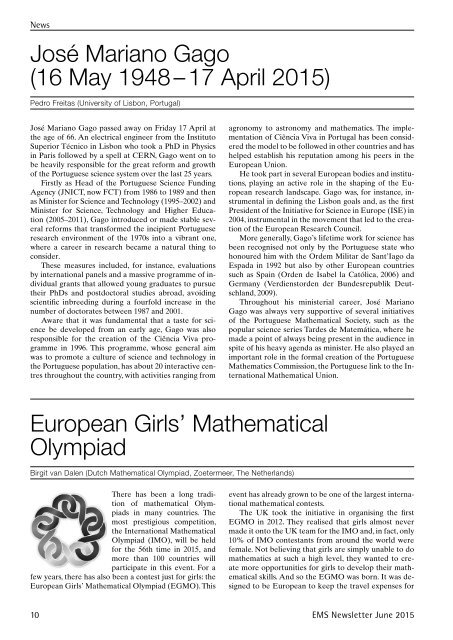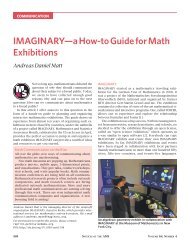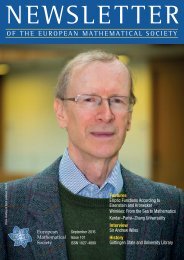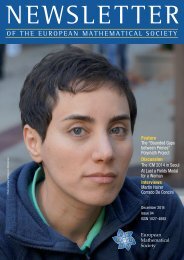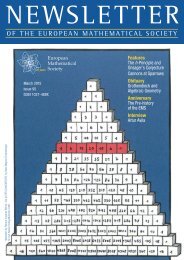2015-06-96
2015-06-96
2015-06-96
- No tags were found...
Create successful ePaper yourself
Turn your PDF publications into a flip-book with our unique Google optimized e-Paper software.
NewsJosé Mariano Gago(16 May 1948 – 17 April <strong>2015</strong>)Pedro Freitas (University of Lisbon, Portugal)José Mariano Gago passed away on Friday 17 April atthe age of 66. An electrical engineer from the InstitutoSuperior Técnico in Lisbon who took a PhD in Physicsin Paris followed by a spell at CERN, Gago went on tobe heavily responsible for the great reform and growthof the Portuguese science system over the last 25 years.Firstly as Head of the Portuguese Science FundingAgency (JNICT, now FCT) from 1986 to 1989 and thenas Minister for Science and Technology (1995–2002) andMinister for Science, Technology and Higher Education(2005–2011), Gago introduced or made stable severalreforms that transformed the incipient Portugueseresearch environment of the 1970s into a vibrant one,where a career in research became a natural thing toconsider.These measures included, for instance, evaluationsby international panels and a massive programme of individualgrants that allowed young graduates to pursuetheir PhDs and postdoctoral studies abroad, avoidingscientific inbreeding during a fourfold increase in thenumber of doctorates between 1987 and 2001.Aware that it was fundamental that a taste for sciencebe developed from an early age, Gago was alsoresponsible for the creation of the Ciência Viva programmein 19<strong>96</strong>. This programme, whose general aimwas to promote a culture of science and technology inthe Portuguese population, has about 20 interactive centresthroughout the country, with activities ranging fromagronomy to astronomy and mathematics. The implementationof Ciência Viva in Portugal has been consideredthe model to be followed in other countries and hashelped establish his reputation among his peers in theEuropean Union.He took part in several European bodies and institutions,playing an active role in the shaping of the Europeanresearch landscape. Gago was, for instance, instrumentalin defining the Lisbon goals and, as the firstPresident of the Initiative for Science in Europe (ISE) in2004, instrumental in the movement that led to the creationof the European Research Council.More generally, Gago’s lifetime work for science hasbeen recognised not only by the Portuguese state whohonoured him with the Ordem Militar de Sant’Iago daEspada in 1992 but also by other European countriessuch as Spain (Orden de Isabel la Católica, 20<strong>06</strong>) andGermany (Verdienstorden der Bundesrepublik Deutschland,2009).Throughout his ministerial career, José MarianoGago was always very supportive of several initiativesof the Portuguese Mathematical Society, such as thepopular science series Tardes de Matemática, where hemade a point of always being present in the audience inspite of his heavy agenda as minister. He also played animportant role in the formal creation of the PortugueseMathematics Commission, the Portuguese link to the InternationalMathematical Union.European Girls’ MathematicalOlympiadBirgit van Dalen (Dutch Mathematical Olympiad, Zoetermeer, The Netherlands)There has been a long traditionof mathematical Olympiadsin many countries. Themost prestigious competition,the International MathematicalOlympiad (IMO), will be heldfor the 56th time in <strong>2015</strong>, andmore than 100 countries willparticipate in this event. For afew years, there has also been a contest just for girls: theEuropean Girls’ Mathematical Olympiad (EGMO). Thisevent has already grown to be one of the largest internationalmathematical contests.The UK took the initiative in organising the firstEGMO in 2012. They realised that girls almost nevermade it onto the UK team for the IMO and, in fact, only10% of IMO contestants from around the world werefemale. Not believing that girls are simply unable to domathematics at such a high level, they wanted to createmore opportunities for girls to develop their mathematicalskills. And so the EGMO was born. It was designedto be European to keep the travel expenses for10 EMS Newsletter June <strong>2015</strong>


